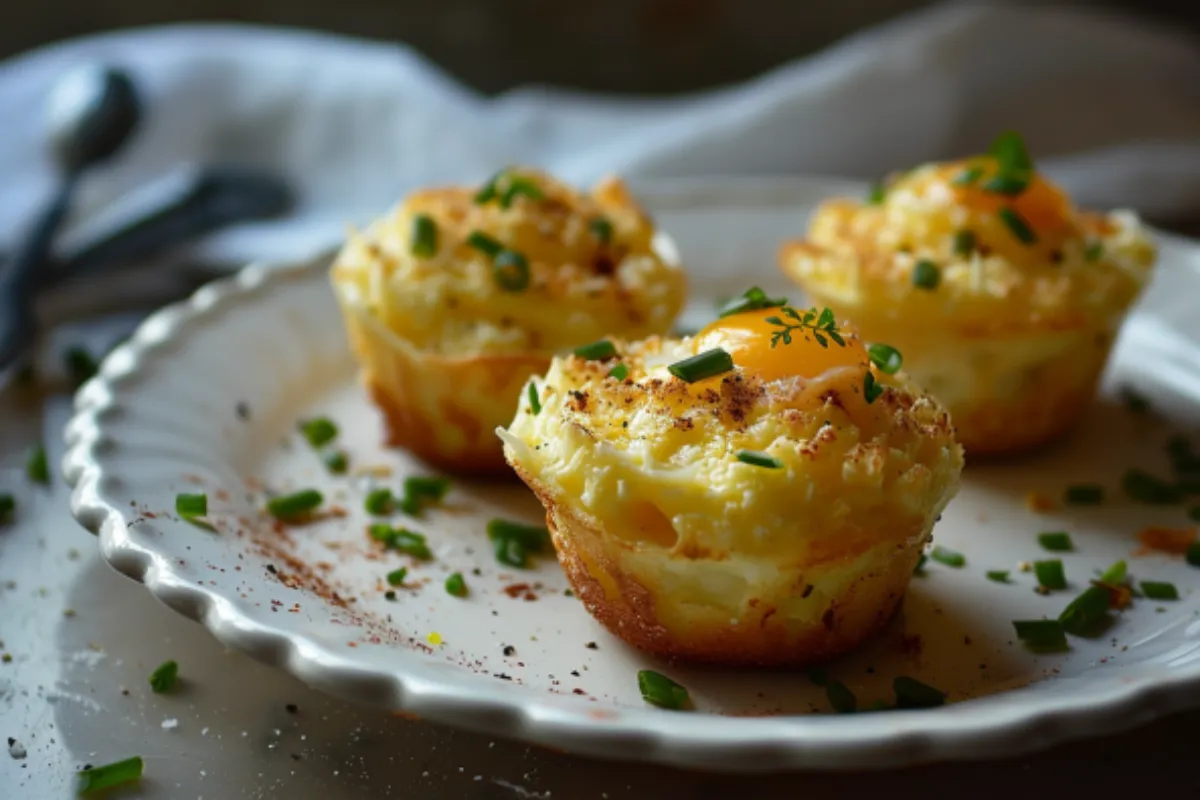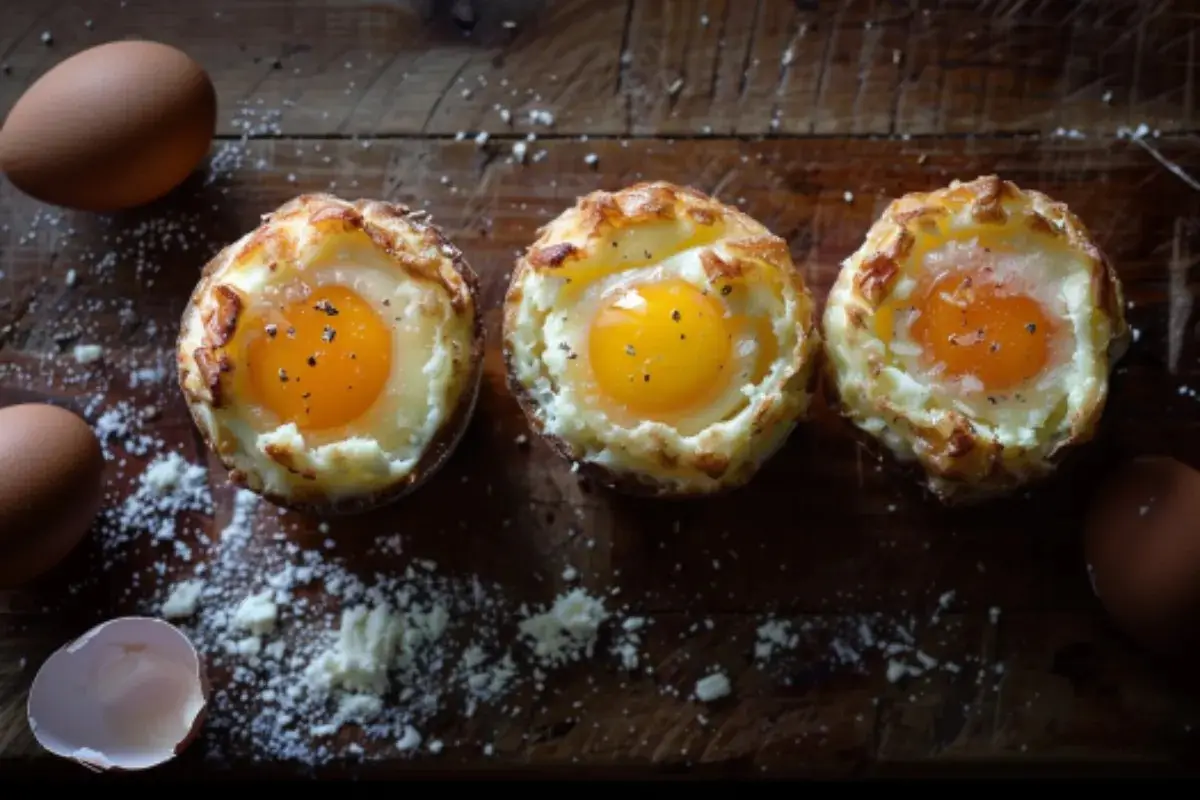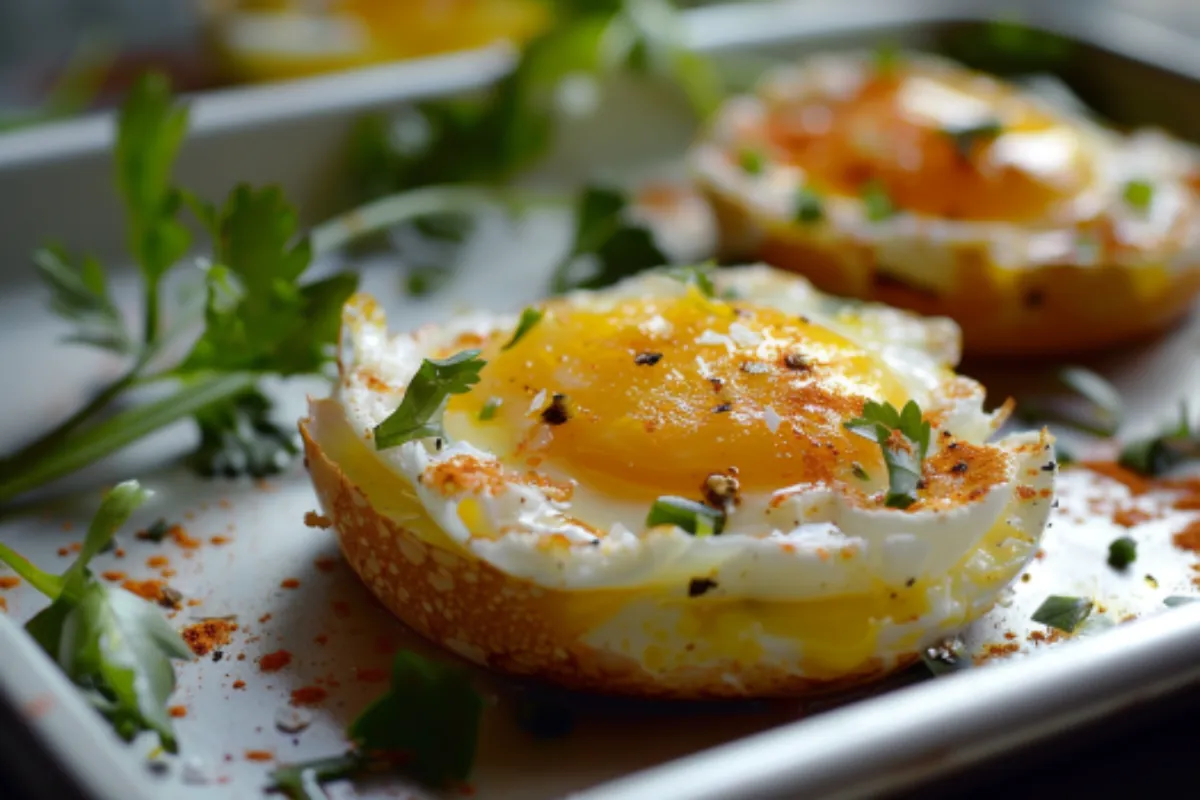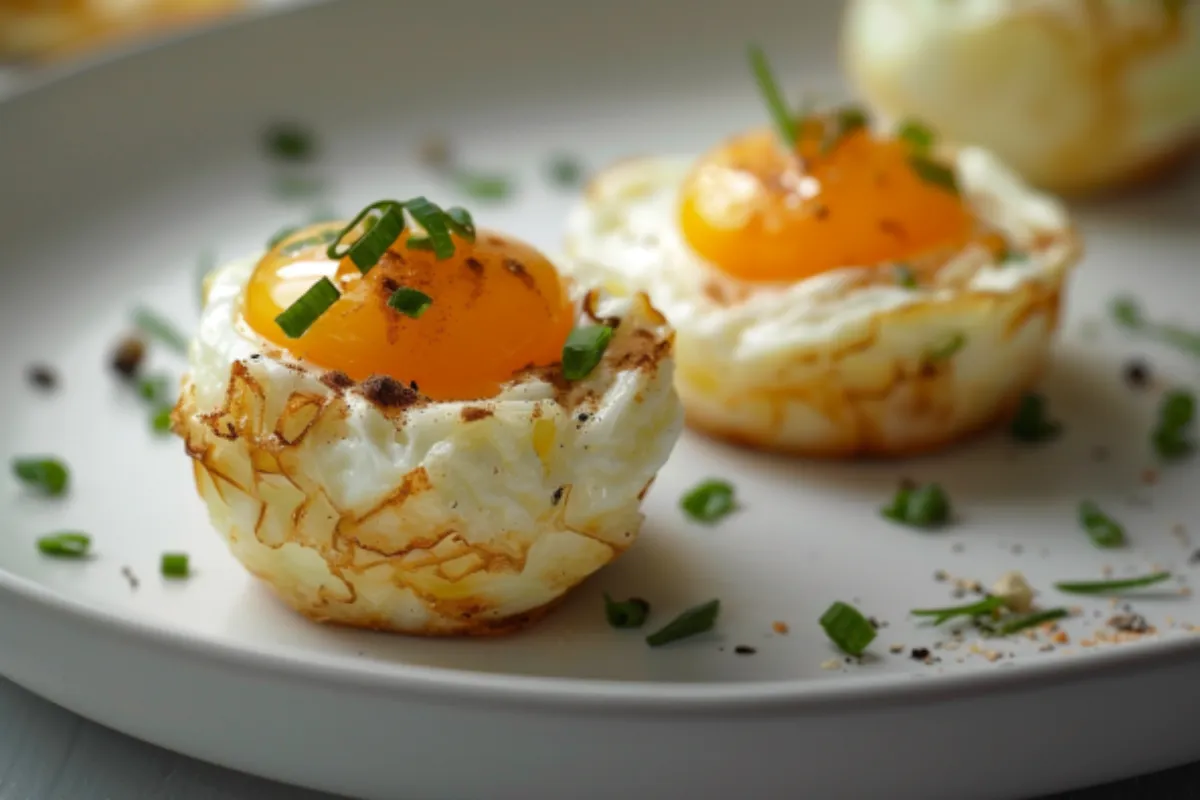Egg bites are a popular breakfast choice because they are convenient, customizable, and packed with protein. However, there’s nothing more frustrating than trying to remove them from the muffin pan, only to find them stuck and torn apart. This is a common problem, but it’s easy to solve once you understand the causes and apply a few practical techniques. In this guide, we’ll show you how to keep egg bites from sticking to the muffin pan. Follow these tips to ensure perfect results every time.
Why Do Egg Bites Stick to the Muffin Pan?
To effectively prevent egg bites from sticking, it’s crucial to understand the root causes of the problem:
- Chemical Reactions: Eggs are high in protein, and heat changes their structure. When you bake eggs in a pan, these proteins bond with the metal surface, especially if it’s a metal pan. This reaction is stronger if there’s not enough fat or oil between the eggs and the pan.
- Lack of Proper Coating: One of the most common mistakes is not using enough non-stick spray, butter, or oil. Without adequate coating, the eggs will directly contact the pan’s surface, making it easier for them to adhere and stick.
- Type of Pan Used: Different muffin pans have varying levels of stickiness. Non-stick pans are coated to prevent food from sticking, but they can lose their effectiveness over time. Silicone pans are naturally non-stick, but they may not brown food as well as metal pans. For more on using silicone pans, see this guide to baking with silicone molds.
- Temperature Fluctuations: If the oven isn’t properly preheated or the temperature changes during cooking, the egg bites may cook unevenly. Uneven cooking causes some parts to stick while others remain undercooked.
Now that you know the main reasons behind the sticking, let’s explore the different types of muffin pans and how each type impacts the sticking problem.
Choosing the Right Muffin Pan

The muffin pan you choose is critical for preventing your egg bites from sticking. Here’s an in-depth look at different types of muffin pans and their pros and cons:
Non-Stick Metal Muffin Pans: These pans are coated with a special layer designed to prevent food from sticking. They are an excellent choice for egg bites because they distribute heat evenly, resulting in uniform cooking and a nice browned exterior. However, over time, the coating can degrade, particularly if abrasive cleaners or metal utensils are used. To maximize the lifespan of a non-stick pan:
Always use wooden, silicone, or plastic utensils to avoid scratches.
Avoid using abrasive sponges or harsh cleaning agents.
Store them carefully to prevent the coating from chipping or scratching.
Silicone Muffin Pans: Silicone pans are inherently non-stick and flexible, allowing you to pop out egg bites with ease. They do not require any additional non-stick spray or oil, though using a light coating can enhance their non-stick properties even further. One downside is that silicone pans may not brown the edges of the egg bites as effectively as metal pans, which some people prefer for a slightly crispy texture. If you value convenience and easy cleaning over browning, silicone is a great choice.
Aluminum Muffin Pans: Aluminum pans conduct heat very well, which helps with even cooking. However, they do not have a non-stick coating, so you will need to use plenty of butter, oil, or non-stick spray. These pans are prone to rusting if not dried properly after washing, and they may react with acidic ingredients, affecting the flavor of your egg bites.
Stainless Steel Muffin Pans: Stainless steel pans are durable and resistant to rust and corrosion. However, they do not have a non-stick coating and are more prone to sticking unless adequately greased. These pans are a good choice for those who prefer a long-lasting, sturdy option, but they require more effort to prevent sticking.
Cast Iron Muffin Pans: Cast iron pans are known for their excellent heat retention and ability to provide a unique flavor to baked goods. However, they are heavy and require regular seasoning to maintain their non-stick surface. They are also prone to rusting if not properly cared for. If you enjoy the flavor and rustic look that cast iron provides, make sure to keep them well-seasoned and use a generous amount of fat to prevent sticking. For more on proper maintenance, refer to this guide on cleaning muffin pans.
Choosing the right muffin pan ultimately depends on your personal preferences and baking habits. For more guidance on selecting the perfect pan, refer to the perfect egg bites recipes and tips.
Proper Coating Techniques
Once you’ve chosen the right pan, using the proper coating technique is essential to keep your egg bites from sticking. Here are several effective methods:
Non-Stick Spray: A quick and easy solution is to use a non-stick cooking spray. Spray each cup of the muffin pan thoroughly, ensuring complete coverage on all sides and the bottom. Be generous, but avoid creating pools of spray, which can burn in the oven. Opt for a neutral-flavored spray, such as canola or avocado oil, to prevent any unwanted flavors from transferring to your egg bites.
Butter or Oil: Using a brush or paper towel, apply a thin layer of melted butter or oil to each cup of the muffin pan. This method ensures that every part of the cup is covered, creating a barrier between the eggs and the pan. Olive oil, vegetable oil, or melted butter are all good options, though each adds a slight flavor to the egg bites. Choose an oil that complements the flavor of your recipe.
Parchment Paper Circles: If you prefer not to use sprays or oils, consider cutting parchment paper into small circles that fit the bottom of each muffin cup. This method creates a physical barrier between the pan and the egg mixture, which is especially useful if you are using a pan that is prone to sticking. Parchment paper can be combined with other methods for added protection.
Muffin Liners: Paper or silicone muffin liners are among the most reliable options. Paper liners are inexpensive and disposable, while silicone liners are reusable and environmentally friendly. Both types provide a barrier that prevents sticking and makes cleanup easy. Silicone liners, in particular, are very effective and can be reused countless times. You can learn more about the benefits of using paper liners.
Baking Spray with Flour: Some non-stick sprays contain flour, which can provide an extra layer of protection against sticking. This type of spray is often used in baking cakes and muffins and can work equally well for egg bites. The flour helps create a slight crust on the outside of the egg bites, preventing them from sticking to the pan.
Using these coating techniques, you can significantly reduce the chances of your egg bites sticking to the muffin pan.
Importance of Preheating and Temperature Control
Proper preheating and maintaining the correct temperature are vital for baking egg bites that do not stick:
- Preheating the Oven: Always preheat your oven to the temperature recommended by your recipe, which is typically between 325°F and 375°F (160°C to 190°C). Preheating ensures that the cooking process starts immediately when you place the pan in the oven, reducing the time the egg mixture has to settle and potentially stick to the pan.
- Consistent Temperature: Maintaining a consistent oven temperature is equally important. If the temperature fluctuates, it can cause uneven cooking, which may lead to sticking. Use an oven thermometer to monitor the temperature throughout the baking process, as many ovens have a margin of error.
- Rack Position: Place the muffin pan in the center of the oven to allow for even heat distribution. Placing the pan too close to the heating elements can cause uneven cooking, with some areas overcooking and others undercooking, increasing the likelihood of sticking.
- Avoid Opening the Oven Door Frequently: Each time the oven door is opened, the temperature can drop significantly, causing fluctuations that affect cooking. Try to keep the door closed as much as possible during baking.
By managing these temperature factors, you can ensure that your egg bites cook evenly and do not stick to the pan.
Preparing the Egg Mixture Properly

The way you prepare your egg mixture can also impact whether or not your egg bites stick to the pan. Here are some tips for preparing a mixture that is less likely to stick:
- Use Moisture-Rich Ingredients: Adding moisture-rich ingredients like cottage cheese, cream, or ricotta to your egg mixture can help create a fluffier texture that is less likely to stick. These ingredients provide extra moisture and fat, which helps the egg bites release from the pan more easily.
- Bring Eggs to Room Temperature: Cold eggs can cause the mixture to stick more easily because they do not blend as smoothly with other ingredients. Allow your eggs to come to room temperature before mixing them to create a more uniform mixture that is less likely to stick.
- Avoid Over-Beating: Over-beating the eggs can incorporate too much air into the mixture, leading to a tough texture that increases the likelihood of sticking. Mix your ingredients just until they are combined to ensure a smooth, even consistency.
- Add a Binding Agent: Consider adding a small amount of flour or cornstarch to the egg mixture. This can help bind the ingredients together, creating a firmer texture that is less prone to sticking. A teaspoon or two is usually sufficient.
- Incorporate Cheese Carefully: If you are using cheese in your egg bites, grate it finely and mix it thoroughly with the other ingredients. Large chunks of cheese can melt and cause sticking. Cheese with a higher moisture content, such as mozzarella or Monterey Jack, is less likely to cause sticking than harder cheeses like Parmesan.
For additional ideas on how to store your egg bites and keep them fresh, check out how long egg bites last in the fridge.
Tips for Baking Egg Bites in Muffin Pans
To further ensure your egg bites don’t stick, follow these additional baking tips:
- Position the Pan Correctly: Always place the muffin pan in the center of the oven to allow for even cooking. Avoid placing the pan too close to the heating elements, which can cause uneven cooking and sticking.
- Rotate the Pan: Halfway through the baking process, rotate the pan to ensure even cooking. This simple step can prevent hot spots from causing certain areas of the egg bites to stick.
- Check for Doneness: Use a toothpick to check for doneness. Insert it into the center of one of the egg bites; if it comes out clean or with a few moist crumbs, the egg bites are done. If the toothpick comes out with wet batter, continue baking for a few more minutes.
- Let the Pan Cool Slightly: Once the egg bites are done, allow the pan to cool for a few minutes before attempting to remove them. This can help the egg bites contract slightly, making them easier to remove without tearing.
- Use a Thin Spatula: If some egg bites are still stuck, use a thin silicone or plastic spatula to gently loosen the edges before lifting them out. Be careful not to scratch the non-stick surface of your pan.
- Avoid Overbaking: Overbaking can make the egg bites dry and more likely to stick to the pan. Keep an eye on the cooking time, and remove the pan from the oven as soon as the egg bites are set.
Cleaning and Maintenance of Muffin Pans
Proper cleaning and maintenance of your muffin pans are crucial for keeping them in good condition and preventing future sticking:
- Soak the Pans After Use: After removing the egg bites, soak the muffin pans in warm, soapy water immediately to help loosen any remaining residue. This will make cleaning easier without the need for harsh scrubbing that could damage the pan.
- Avoid Abrasive Cleaners: Using abrasive sponges or cleaners can damage the non-stick coating on your pans, making them more prone to sticking in the future. Instead, use a soft sponge or cloth to clean the pans gently.
- Use Baking Soda for Stubborn Residue: For any stubborn, baked-on residue, create a paste with baking soda and water and gently scrub the affected areas. This method is effective for both metal and silicone pans.
- Dry Thoroughly: Always dry your muffin pans thoroughly after washing to prevent rust, particularly if you are using metal pans. Water left on the surface can cause rust spots and damage the pan over time.
- Season Your Pans Regularly: If you’re using cast iron or carbon steel muffin pans, it’s important to season them regularly. Seasoning creates a natural non-stick surface and prevents rusting. To season a pan, rub a small amount of oil onto its surface and bake it in the oven at a high temperature for an hour.
- Store Carefully: Store your muffin pans in a dry place to prevent rust and maintain their non-stick properties. Avoid stacking heavy items on top of non-stick pans, as this can damage the coating. If you must stack pans, place a protective layer, such as a paper towel or silicone mat, between them to prevent scratches.
Additional Tips and Tricks for Perfect Egg Bites

Here are a few more advanced tips to ensure your egg bites come out perfectly every time:
- Experiment with Ingredients: Some ingredients, such as certain types of cheese or vegetables with a high water content, can cause sticking due to their melting properties. If you notice that particular ingredients are causing issues, try adjusting the recipe or changing the ingredients to find the best combination for your egg bites.
- Use a Release Agent: If you frequently bake egg bites or other sticky foods, consider investing in a release agent specifically designed for baking. These sprays are formulated to prevent sticking, even in challenging situations.
- Silicone Liners as a Long-Term Investment: While silicone liners may have a higher upfront cost than paper liners, they can save money in the long run by being reusable and more effective at preventing sticking. Additionally, they are easier to clean and store.
- Experiment with Different Baking Times: Not all ovens are created equal, and the baking time for your egg bites may vary depending on your oven’s temperature accuracy and heat distribution. Keep an eye on your egg bites during the baking process, and adjust the cooking time as needed.
- Consider a Water Bath: If you’re still having trouble with sticking, try placing your muffin pan in a larger baking dish filled with a small amount of water. This technique, known as a water bath, can help create a more humid environment in the oven, preventing the egg bites from drying out and sticking to the pan.
- Avoid High-Protein Additions: If your egg bites are consistently sticking, consider avoiding high-protein additions like meat or cheese that can bond with the pan’s surface. Alternatively, make sure these ingredients are well-incorporated into the egg mixture, rather than sitting on top.
Frequently Asked Questions
1. How do you keep egg muffins from sticking to the muffin pan?
To keep egg muffins from sticking, use a non-stick spray, muffin liners, or a silicone pan. Ensure the oven is properly preheated, and the muffin pan is well-coated.
2. Can I use paper muffin liners for egg bites?
Yes, paper liners are a good option to prevent sticking. However, they may not be as effective as silicone liners, which are reusable and provide excellent non-stick performance.
3. What is the best non-stick spray for egg bites?
A neutral-flavored spray like canola or avocado oil is recommended, as these do not leave any unwanted flavors.
4. Do silicone muffin pans require coating?
Generally, silicone muffin pans do not require additional coating, but a light spray can help enhance their non-stick properties.
5. Are there any substitutes for non-stick spray?
Yes, alternatives like melted butter, olive oil, or parchment paper can work well to prevent sticking.
Conclusion
Keeping egg bites from sticking to your muffin pan involves understanding the causes, choosing the right pan, using proper coating techniques, and maintaining the correct temperature. By following these methods, you can avoid the frustration of stuck egg bites and enjoy a perfect breakfast every time. Keep your pans in good condition, try different techniques, and adjust as needed to find what works best for you. For more tips on making perfect egg bites, check out the ultimate guide on egg bites. Enjoy your cooking!

